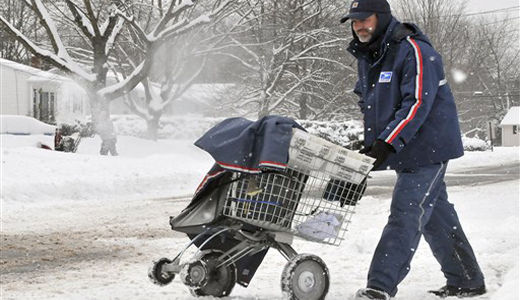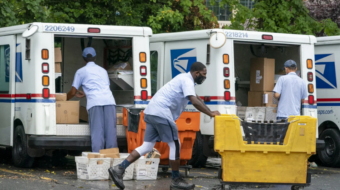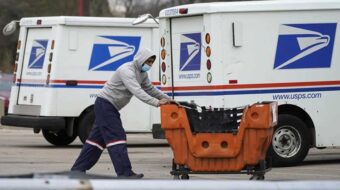
CHICAGO — Who doesn’t love the smiling letter carrier who hands you the mail, pulls cats out of trees, braves fires, chases away burglars and engages in numberless additional acts of heroism? A letter carrier in Pittsburgh noticed that the mail of an 81-year-old woman on his route had begun to accumulate. Checking out the back of the house, he saw an open door, the TV on, and the woman stuck in an upstairs bath tub where she stayed alive by drinking the tap water for three days.
This reporter took a two-block walk with a young Black mail carrier who was on his South Shore route here last Saturday. While no outright heroics were in evidence there was much that people in any neighborhood could love.
Many of the routes in the 60649 Zip Code are undesirable because the neighborhood can get pretty rough and there are buildings with lots of stairs. My letter carrier got this assignment because of less seniority.
There are apartment buildings overlooking Lake Michigan, well appointed private homes, a run-down tenement and some low-income townhouses along his route.
People in this South Shore neighborhood like him.
Last Christmas a woman baked him a batch of oatmeal cookies.
“You’re the best,” said the owner of a four-unit apartment house on the block.
The minister who lives in the house next to the Baptist Church on the corner asked him if he would be interested in trying out for a local softball team.
A man driving by honked his horn and yelled a “hello.”
The mail carrier displayed a keen understanding of things going on around him.
“Are you OK?,” he asked the dazed-looking superintendent of another apartment building on the block. “Too much partying last night,” he said with a smile.
“There’s no one in here waiting for this water bill,” he noted, after surveying the melting mounds of snow around a boarded-up house.
“Let me take that,” said a woman who reached down from a second floor landing, saving him some steps.
He stopped to scold two teenagers who were sitting on a stoop, arguing with and cursing at one another.
He did a bee line around a woman standing in the middle of the sidewalk, looking at us as we approached. “Crack dealer,” he said.
Two pit bulls run around in the fenced in yard in front of another house on the block. He tied together a small stack of mail with a rubber band and threw it past them onto the landing atop three steps leading to the front door. “Those two wouldn’t hurt a fly,” he said, “but I hate them jumping up and kissing on me.”
If the U.S. Postal Service has its way that scene and countless others like it will no longer be part of Saturday in America.
The union leader who represents the mail carriers of the United States says cutting out Saturday deliveries is an almost unthinkable assault on an American institution.
“Saturday is the one day of the week that most people are home and can read their mail immediately. That will be gone and the 203,000 members of my union will still have to tackle the same volume of mail in five days instead of six,” said Letter Carriers union president Frederic Rolando, when he was interviewed last week during an AFL-CIO executive council meeting in Orlando.
The cuts, which will also increase workloads for 46,000 Mail Handlers and 218,500 Postal Workers, are needed the USPS says, to close an $8 billion deficit for this year. The USPS claims to have lost $7 billion in the 12 months prior to this year due to what it says is a 16 percent drop in mail volume. The agency blames the recession and a federal requirement that it pre-pay funds into its health and pension programs.
Rolando claims that cutting out Saturday delivery will not produce savings and that “a six-day delivery network is essential to increasing revenue.”
He challenged USPS claims about falling volume and noted that in Portland, Oregon, “volume is high enough and staffing is short enough to require the mail deliverers to finish their routes in the dark, wearing miners’ lamps so they can see what they are doing.”
Rolando said the requirement to pre-fund the health and pension plans is not demanded of private industry. “They had to borrow $19 billion in order to pay $12 billion into this phantom fund,” he said. If you relieve the USPS of this liability the USPS would turn a profit of some $2 – $4 billion a year, he explained.
On top of that, Rolando said, the government overcharged the USPS $75 billion for pension costs. His claim is backed up by a recent Postal Service Inspector General’s report.
“If you stuck that money into the retiree health care fund you would wipe out the deficit and there could be an increase in services, volume and jobs,” he said.
Saturday mail delivery, an American institution, would be saved.
Photo: Postal worker delivers mail after snow storm in Enfield, Conn. (AP Photo/Jessica Hill)










